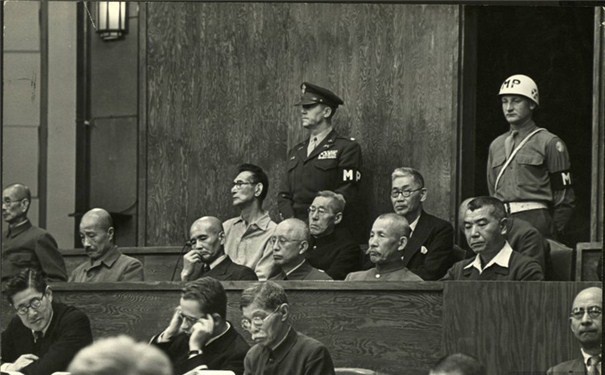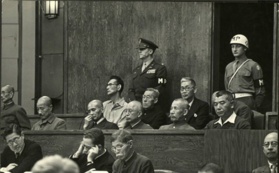By Zhongsheng Source: People’s Daily
“Mr. President, this is no ordinary trial, for here we are waging a part of the determined battle of civilization to preserve the entire world from destruction … If there is no justification for punishment of individuals who have already brought civilization to the brink of disaster, then justice itself is a mockery.”
The above remarks are recited from the opening statement of Joseph B. Keenan to the International Military Tribunal Far East (IMTFE), also known as the Tokyo Trials, as chief prosecutor in 1946.
By quoting these words at an international forum on the Tokyo Trials and world peace, held on November 12, Gao Wenbin, a 95-year-old professor who witnessed the Tokyo trials in court, stressed the importance of the trials in enlightening later generations.
This year marks the 70th anniversary of the opening of the Tokyo Trials. By bringing those who waged aggressive war and murdered innocent people in the victimized countries to account, the trials on Japanese war criminals 70 years ago upheld international justice and defended the dignity of humanity.
Scholars commented that the Tokyo Trials were a further “settlement” than the war itself, because it used the power of the law instead of military power. Its significance is not confined to those involved, but offers insight and enlightenment to later generations.
Experts from different countries noted at the seminar that the Tokyo Trials were of vital importance in a host of spheres, like international politics, international law and historic course.
In the perspective of international politics, it laid the foundation for the post-war international order in Asia along with the Cairo Declaration and the Potsdam Proclamation.
In terms of international law, the Tokyo Trials represent the “victory of justice” instead of the “victory of the winners.” It enriched the principle of nulla poena sine lege (no penalty without a law) and cemented the consensus that no war is legal. The concepts derived from this consensus, such as “crimes of aggression,” “crimes against humanity” as well as “individuals are responsible for war crimes,” provide a crucial reference to the theoretical studies and practice of international law.
The Tokyo Trials also worked as a “recorder” of history. The evidence gathered for the trials constituted a giant database for history, covering Japanese history from the end of the 1820s to its surrender in 1945, especially the aggression war launched by Japanese rulers as well as the crimes they committed during the war.
With detailed files and testimonies, the Tokyo Trials provided damning evidence of the crimes committed by Japanese militarists and stands as a warning to the world and the future.
The meanings behind the studies on the Tokyo Trials go beyond academic and historical importance. If put under the context of post-war politics in East Asia, Japan’s attitude toward the Tokyo Trials almost serves as an “indicator” of its political ecosystem.
Words about denials of the Tokyo Trials were not on the horizon of the Japanese public before 1970s, but such ideology emerged in the 1980s as its right-wing forces mulled a “complete reshuffle” of post-war politics. This kind of mentality prevailed to political, ideological, academic, educational and cultural circles since the beginning of 1990s as Japan fought hard to be a global “political power.”
With the right gaining more ground in Japan’s political arena in the past few years, some senior officials uttered remarks about distortions in the trials, and some even staged concrete actions to smear the final ruling of the trials. The repeated visits of Japanese officials to the notorious war-linked Yasukuni Shrine are one such example.
Last summer, the Liberal-Democratic Party of Japan (LDP) even announced that they would conduct an “investigation and verification” of the procedures of the Tokyo trials, which reveals Japan’s intention of historical revisionism.
The recent events in Asia, especially a series of actions Japan made to breach the post-war system, have raised concerns about the current regional peace. Against such a background, it is certainly important that different countries come together to ease anxiety and maintain regional stability by protecting the authority and solemnity of international law and order.
In other words, each country in East Asia and international society should frequently consider the historical and realistic meanings of the Tokyo trials in a correct way.
A Japanese journalist once made a metaphor at the first day of the Tokyo Trials, saying “each scene can be compared to the classics of Shakespeare.” As the unique appeal of Shakespeare’s work lies in its enlightenment beyond time, the Tokyo trials will demonstrate more far-reaching significance with the history moving forward.
The above remarks are recited from the opening statement of Joseph B. Keenan to the International Military Tribunal Far East (IMTFE), also known as the Tokyo Trials, as chief prosecutor in 1946.
By quoting these words at an international forum on the Tokyo Trials and world peace, held on November 12, Gao Wenbin, a 95-year-old professor who witnessed the Tokyo trials in court, stressed the importance of the trials in enlightening later generations.
This year marks the 70th anniversary of the opening of the Tokyo Trials. By bringing those who waged aggressive war and murdered innocent people in the victimized countries to account, the trials on Japanese war criminals 70 years ago upheld international justice and defended the dignity of humanity.
Scholars commented that the Tokyo Trials were a further “settlement” than the war itself, because it used the power of the law instead of military power. Its significance is not confined to those involved, but offers insight and enlightenment to later generations.
Experts from different countries noted at the seminar that the Tokyo Trials were of vital importance in a host of spheres, like international politics, international law and historic course.
In the perspective of international politics, it laid the foundation for the post-war international order in Asia along with the Cairo Declaration and the Potsdam Proclamation.
In terms of international law, the Tokyo Trials represent the “victory of justice” instead of the “victory of the winners.” It enriched the principle of nulla poena sine lege (no penalty without a law) and cemented the consensus that no war is legal. The concepts derived from this consensus, such as “crimes of aggression,” “crimes against humanity” as well as “individuals are responsible for war crimes,” provide a crucial reference to the theoretical studies and practice of international law.
The Tokyo Trials also worked as a “recorder” of history. The evidence gathered for the trials constituted a giant database for history, covering Japanese history from the end of the 1820s to its surrender in 1945, especially the aggression war launched by Japanese rulers as well as the crimes they committed during the war.
With detailed files and testimonies, the Tokyo Trials provided damning evidence of the crimes committed by Japanese militarists and stands as a warning to the world and the future.
The meanings behind the studies on the Tokyo Trials go beyond academic and historical importance. If put under the context of post-war politics in East Asia, Japan’s attitude toward the Tokyo Trials almost serves as an “indicator” of its political ecosystem.
Words about denials of the Tokyo Trials were not on the horizon of the Japanese public before 1970s, but such ideology emerged in the 1980s as its right-wing forces mulled a “complete reshuffle” of post-war politics. This kind of mentality prevailed to political, ideological, academic, educational and cultural circles since the beginning of 1990s as Japan fought hard to be a global “political power.”
With the right gaining more ground in Japan’s political arena in the past few years, some senior officials uttered remarks about distortions in the trials, and some even staged concrete actions to smear the final ruling of the trials. The repeated visits of Japanese officials to the notorious war-linked Yasukuni Shrine are one such example.
Last summer, the Liberal-Democratic Party of Japan (LDP) even announced that they would conduct an “investigation and verification” of the procedures of the Tokyo trials, which reveals Japan’s intention of historical revisionism.
The recent events in Asia, especially a series of actions Japan made to breach the post-war system, have raised concerns about the current regional peace. Against such a background, it is certainly important that different countries come together to ease anxiety and maintain regional stability by protecting the authority and solemnity of international law and order.
In other words, each country in East Asia and international society should frequently consider the historical and realistic meanings of the Tokyo trials in a correct way.
A Japanese journalist once made a metaphor at the first day of the Tokyo Trials, saying “each scene can be compared to the classics of Shakespeare.” As the unique appeal of Shakespeare’s work lies in its enlightenment beyond time, the Tokyo trials will demonstrate more far-reaching significance with the history moving forward.
 Menu
Menu
 Op-ed: Tokyo Trials should never be forgotten
Op-ed: Tokyo Trials should never be forgotten

















